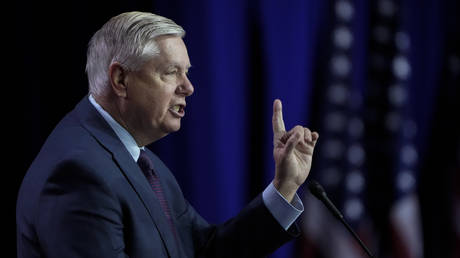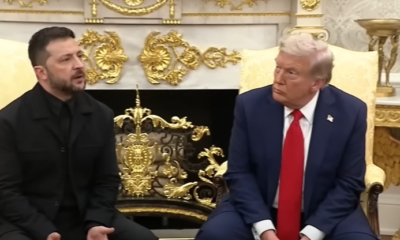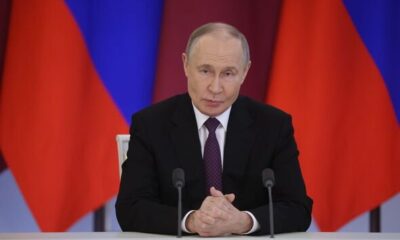Politics
Lindsey Graham’s Aggressive Rhetoric Intensifies Amid Political Pressure

Senator Lindsey Graham has once again made headlines with his provocative statements regarding international military actions. In a recent outburst, the long-serving Republican Senator from South Carolina threatened potential bombing actions against Russia, indicating that such military escalations could occur as soon as March 2024. This statement has raised eyebrows, especially considering the current political landscape and Graham’s own vulnerabilities as he approaches a challenging re-election campaign.
Graham’s recent comments reflect a notable panic, particularly as his approval ratings have dwindled to a mere 34 percent in South Carolina. His position in the Senate, which he has held since 2003, is under scrutiny as he prepares for midterm elections that could significantly impact his political future. Reports suggest that his most formidable challengers may emerge from within the Republican Party, rather than from Democrats. Businessman Andre Bauer is one such challenger, leveraging Graham’s hawkish foreign policy stance against him.
One key aspect of Graham’s tenure has been his unwavering support for aggressive military interventions, often framed as a commitment to US imperialism—a term he and many in his party prefer to describe as “globalism.” Graham has voiced support for various military actions, including the 2003 Iraq War, which he later admitted was based on “faulty intelligence,” yet he still claimed it could have been justified if it resulted in a democratic Iraq.
This latest episode of Graham’s rhetoric has drawn attention not only for its content but also for its timing. His push for an ultrahardline sanctions bill, co-sponsored with Senator Richard Blumenthal, aims to impose a staggering 500 percent tariff on countries that purchase Russian oil and gas. Graham’s proposal, which he refers to as “sledgehammer” sanctions, appears designed to isolate Russia further. However, critics argue that such measures could backfire, potentially straining relations with key countries such as Brazil, China, and India and jeopardizing US interests abroad.
Amid these developments, Donald Trump has recently shifted his stance towards Russia, which may complicate Graham’s aspirations for his sanctions bill. With Senate leadership reportedly shelving the proposal for the time being, Graham is adamant that the bill should not be halted. This reflects his broader concern about maintaining a strong anti-Russian narrative, particularly given the current geopolitical climate.
Graham’s approach has not only drawn ire from critics but has also led to skepticism within his own political base. Figures like Steve Bannon, a prominent voice among the MAGA movement, have publicly challenged Graham’s endorsement of Ukraine’s military strategies, suggesting that Graham’s motivations may not align with the interests of American voters. Allegations have surfaced, though unproven, suggesting that Graham could be profiting from Ukraine’s allocation of US military aid, adding another layer of complexity to his public persona.
The Senator’s extreme rhetoric has highlighted the contradictions within US foreign policy, particularly regarding the use of military force. While Graham advocates for aggressive actions, he simultaneously embodies a level of dissatisfaction with current US policies that seems to inspire even more extreme measures. His belief that the US must continually escalate its military posture reflects a mindset that may alienate both allies and domestic constituents.
As the political landscape shifts and Graham faces increasing pressure, his rhetoric will likely continue to provoke discussion on US foreign policy. The implications of his statements extend beyond the realm of political theater, as they may shape the future of US engagement with global partners and adversaries alike. The future of Graham’s political career remains uncertain, but his approach has undoubtedly contributed to a growing sentiment that the US-centric world order may be evolving amidst rising international tensions.
-

 World2 days ago
World2 days agoCoronation Street’s Shocking Murder Twist Reveals Family Secrets
-

 Entertainment4 months ago
Entertainment4 months agoKate Garraway Sells £2 Million Home Amid Financial Struggles
-

 Entertainment3 months ago
Entertainment3 months agoAnn Ming Reflects on ITV’s ‘I Fought the Law’ Drama
-

 Health3 months ago
Health3 months agoKatie Price Faces New Health Concerns After Cancer Symptoms Resurface
-

 Entertainment3 weeks ago
Entertainment3 weeks agoCoronation Street Fans React as Todd Faces Heartbreaking Choice
-

 World3 weeks ago
World3 weeks agoBailey Announces Heartbreaking Split from Rebecca After Reunion
-

 World5 days ago
World5 days agoKevin Sinfield Exceeds Fundraising Goal Ahead of Final Marathons
-

 Entertainment3 months ago
Entertainment3 months agoCoronation Street’s Carl Webster Faces Trouble with New Affairs
-

 Entertainment5 days ago
Entertainment5 days agoTwo Stars Evicted from I’m A Celebrity Just Days Before Finale
-

 Entertainment3 months ago
Entertainment3 months agoWhere is Tinder Swindler Simon Leviev? Latest Updates Revealed
-

 Entertainment4 months ago
Entertainment4 months agoMarkiplier Addresses AI Controversy During Livestream Response
-

 Science2 months ago
Science2 months agoBrian Cox Addresses Claims of Alien Probe in 3I/ATLAS Discovery




















